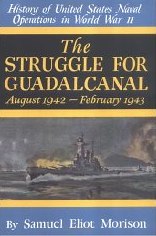Guadalcanal

(order)
(January 15, 2009)
Morison was a naval historian of remarkable breadth and talent, unequalled for telling a grand and vivid story and unparalleled for sorting out detail. No one was better, in this realm, for getting access; he was personally acquainted with every American president from Theodore Roosevelt through John Kennedy, and when WWII broke out he secured a unique appointment as naval historian that gave him carte blanche to go everywhere and see everything. In recounting the confused night action of the Naval Battle of Guadalcanal on 13 November 1942, for example, he explains that the details of the ships’ logs cannot be reconciled and that he will recount each ship’s experience separately; of the cruiser Atlanta, he characteristically observes
Atlanta’s participation in the battle was brief. Japanese destroyers, ever ready to exploit torpedo opportunities, dispatched several salvos at the confused American column. One, perhaps two, hit Atlanta. Their explosion lifted her bodily from the water, then set her down shuddering and crippled. In the plotting room, fire control men watched the needle on the pitometer log (the ship’s speed indicator) slide down the scale until it rested against zero.
The footnote for this paragraph is, simply:
Engagement with Japanese Surface Forces off Guadalcanal Night of 12-13 Nov 1942 and Loss of USS Atlanta 20 No 1942; personal recollection
He wasn’t there on November 13 — I believe he was still in North Africa, where Eisenhower landed the week before — but he got to Guadalcanal not long after and no doubt he got plenty of straight dope. Few other Official Historians of a world war would remember the misery of trying to save wounded sailors on the Atlanta amid oil and blood and water and fires, or how everything was made worse because the spuds locker had been split open and people everywhere were slipping on “the treacherous tubers”.
I read the entire 14-volume History of United States Naval Operations in World War II years ago, back while I was writing Storyspace for Windows. Compilers were slow, the code was big, and the library across the street from Eastgate owned the set. The early volumes are slightly marred by occasional bits of jingo cheerleading; even in this fifth volume the Japanese are too often wily, tricky, or sly. Morison spent his career at Harvard when he was not sailing his beloved yacht (or recording a war for his friend Franklin), but he never gets bogged down on the bridge. If an action hinges on a clever improvisation by an engineer or a level-headed judgment by a machinist’s mate, he gives them the same attention he pays to the captains and admirals.